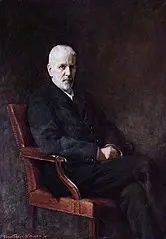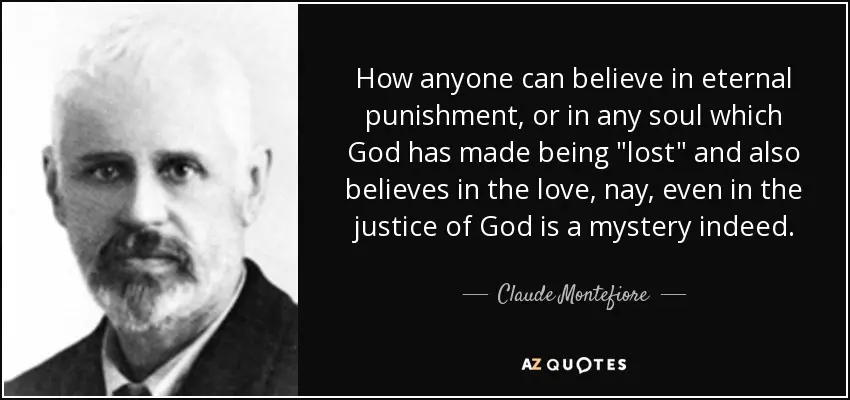 Claude G Montefiore was the intellectual founder of Anglo-Liberal Judaism and the founding president of the World Union for Progressive Judaism, a scholar of the Hebrew Bible, rabbinic literature and New Testament. He was a significant figure in the contexts of modern Jewish religious thought, Jewish-Christian relations, and strove in his works to find a middle ground acceptable to both Jewish and Christian scholars.
Claude G Montefiore was the intellectual founder of Anglo-Liberal Judaism and the founding president of the World Union for Progressive Judaism, a scholar of the Hebrew Bible, rabbinic literature and New Testament. He was a significant figure in the contexts of modern Jewish religious thought, Jewish-Christian relations, and strove in his works to find a middle ground acceptable to both Jewish and Christian scholars.
Introduction
Claude Goldsmid Montefiore devoted his life to academia, philanthropy, and the formation of Liberal Judaism in Britain. However, it is his pioneering contribution to the study of Judaism, Christianity, and Jewish-Christian relations and, to a lesser extent, to dialogue between Jews and Christians that secures his place as an interfaith hero.
Montefiore was born into Anglo-Jewish aristocracy. His youth witnessed the height of the British Empire, when Gladstone and Disraeli took turns at being prime minister. Born in 1858, the year in which Lionel de Rothschild became the first Jew to take his seat in the House of Commons, his father was a nephew of Sir Moses Montefiore and his mother was daughter of Isaac Goldsmid, one of the founders of the non-sectarian University College, London, and of the West London Reform Synagogue.
M0ntefiore’s early years indicate how he was able to obtain an understanding of both Judaism and Christianity. At Oxford University, he was trained by liberal Christians such as Benjamin Jowett (Anglican theologian, scholar, and master of Balliol College) and was able to quote the classical poets and dramatists freely. Jowett was to be a lasting influence. He encouraged Montefiore to devote himself to Judaism and wrote, “I cannot advise you for or against the ministry, but 1 would certainly advise you to lead an ideal life, by which I mean a life not passed in the ordinary pleasures and pursuits of mankind; but in something higher, the study of your own people and their literature, and the means of elevating them. No life will make you as happy as that”.
After Montefiore obtained a first-class degree, he travelled to the Hochschule in with the intention of becoming a rabbi. There he was assigned to and deeply impressed by a young man called Solomon Schechter, already an outstanding biblical and rabbinic scholar. Schechter formed a contrast to his student—a native of Romania, from a Chassidic family, who received a traditional yeshivah education in Lemberg (Lwow) in Galicia. Montefiore helped bring Schechter to Britain, where he taught at Cambridge University and was involved in the discovery of the Cairo Geniza. By the time Schechter had emigrated to the US to become president of the fledgling Jewish Theological Seminary, Montefiore had become a scholar of rabbinic as well as biblical Hebrew. He made clear his debt to Schechter in private correspondence, as well as in public lectures and writings.
Montefiore’s output was prolific, and his works cover many aspects of Jewish life, including biblical studies, rabbinics, Hellenistic and Modern Judaism. He also examined significant aspects of Christian teaching, including the New Testament and theology. His writings, both published and unpublished, could have been produced only by someone steeped in the Jewish tradition, with a profound knowledge of Christianity. His familiarity with Christianity was based not only on academic research and publications but also on personal encounters and engaging in dialogue with leading Christian figures. For example, he befriended the Catholic theologian Friedrich von Hugel, and together they founded the London Society for the Study of Religion in 1904. The society provided a fertile ground for early modern Christian-Jewish dialogue, as it brought together thoughtful men (there were no female members at that time) who remained faithful to their own traditions, while having more in common with one another than with most members of their own denominations.
Montefiore also co-founded the Jewish Quarterly Review in 1889 with Israel Abrahams (the JQR remains the oldest English-language journal of Jewish studies) and was the first Jewish scholar to deliver the Hibbert Lectures in 1892. These attracted enormous attention, because Montefiore courageously accepted many of the results of modern critical scholarship, paid tribute to the teachings of Jesus, and vigorously defended Judaism from Christian criticism.
In the Jewish community, the benefit of Montefiore’s robust response to Christian criticism overshadowed the sentiment of alarm that his opposition to the Mosaic authorship of the Pentateuch, as well as commendation of the Gospels, might have aroused. He argued that the essence of the Bible is most truly shown at its best and not at its worst; its true tendency is found not in Esther but in Jonah. According to Montefiore, the Bible was divine “because of its religious excellence, because of its righteousness and Truth. In other words, the Bible’s value di not depend upon its divinity, it divinity depended upon its value and excellence.
Christianity
Throughout his life, Montefiore reflected on the role of Christianity and, in particular, the significance of Jesus and the New Testament. He called on Jews to abandon the traditionally negative attitude towards Christianity and criticized Jewish scholars who tended to denigrate gospel teaching through a lack of impartiality. He emphasized the importance of balance and sought to achieve it, when reflecting on Christianity.
Previously, it was the norm for Jews to look for defects in Christian works or for parallels in rabbinic writings. “What was true could not be new, and what was new could not be true” summarized many Jewish approaches towards Christianity, demonstrated by the writings of Abraham Geiger and Gerald Friedlander. Montefiore took a more balanced approach. As far as Christians were concerned, he did not have to assume that Jesus was always right; with Jews, he did not feel obligated to always defend the rabbis. As a result, Christian scholars attacked him for being too Jewish and Jewish scholars for being too Christian.
The appropriate moment had arrived, Montefiore proposed, for a Jewish reappraisal of Christianity and a Christian reappraisal of Judaism. It was time for the two to stop judging each other by their defects. Since Montefiore had an understanding of Judaism and Christianity, he believed he was well placed to undertake this task.
Indeed, like a small number of Jewish scholars interested in Christianity before the subject came into vogue, he suggested, with Victorian optimism, that Judaism was on the threshold of a new age that would mark a turning point in Jewish attitudes towards Christianity. Tragically, his optimism was misplaced. Decades would pass, and six million Jews would perish, before such a turning point would be reached, illustrated by the Jewish statements Dabru Emet (2000) and To Do the Will of Our Father in Heaven (2015). In many ways, Montefiore was ahead of the times, illustrated by a desire to introduce the New Testament to Jews, which, he argued, was part of Jewish literature and in which were no Christian elements but which was an entirely Jewish book. He was in favour of Jews studying the whole work, including its anti-Jewish polemic. This, he suggested, should be understood in its historical context, since the early church suffered persecution from many quarters, including the synagogue. Consequently, New Testament authors showed little neutrality when writing about Jews.
Montefiore admired enormously the figure of Jesus, whose teaching was a “revival of prophetic Judaism” and in some respects pointed forward to Liberal Judaism. Jesus emphasised inward goodness at the expense of outward forms, adopting a prophetic attitude towards the Torah. Jesus, Montefiore argued, should be viewed as a great and wise teacher, but in no sense, God.
Reaching a Christian readership was one reason he collaborated with Orthodox Jewish scholar Herbert Loewe, producing A Rabbinic Anthology (1938), in which they offered separate introductions and regularly disagreed with each other’s interpretations. The book remains not only an excellent example of an Orthodox and Liberal Jew working together but a fine introduction into rabbinic literature for Jews and Christians alike.
Montefiore accepted that rabbinic Judaism was legalistic and that rabbinic legalism was greater than the legalism of the Bible. He accepted that there existed dangers to legalism but was critical of the dangers of legalism, not of legalism itself. He argued that, for the most part, these dangers were avoided. This was because the rabbis successfully developed a number of biblical teachings that offset such dangers and made the service of God into a passion. Rabbinical scholar Louis Jacobs commended Montefiore for teaching Christians that the Torah did not become a burden but a joy. He also criticized Montefiore’s attitude towards the rabbis as condescending.
In Rabbinic Literature and Gospel Teaching (1930), Montefiore explained why Christian theologians were unable to appreciate the rabbis’ love of the Torah. “To them [the rabbis] the Law was a delight and no burden and in practice and life all this talk of ‘endless’ injunctions and minutiae is largely a figment of Christian theologians. They only knew and know the Law from outside. How it really affected and affects life they knew and know not.”
Although Montefiore was willing to express criticism of the rabbinic writings, criticism was tempered by comparison with the development of a Christian tradition. For example, he criticized rabbinic writings on circumcision, which drew out some biblical crudities, stating that “reflected or justified imperfections are worse than naive and spontaneous ones.” He went on, however, to compare this to the concept of he3ll in the Gospels which was “bad enough”, but what was said about hell by St. Augustine is far worse.
Conclusion
Montefiore was influenced by both Jewish and Christian thought, which led him to perform an important role in Jewish-Christian relations and in the Jewish study of Christianity. Israel Zangwill once described Montefiore as a “queer mixture, half-Jew, half-Christian,” and it is this queer mixture that allowed the controversial Jewish scholar to gain the respect, if not the approval, of both Jews and Christians.
His positive attitude towards Christianity will not shock us as it did his contemporaries, but a careful reader will notice his courage in tackling anti-Jewish stereotypes during a period of intense Christian criticism. His optimism may have been misplaced in pre-Holocaust Europe; but we would do well to rediscover Montefiore, particularly his writings on the relationship between Jews and Christians, both in New Testament times and in the present day.

![]()

